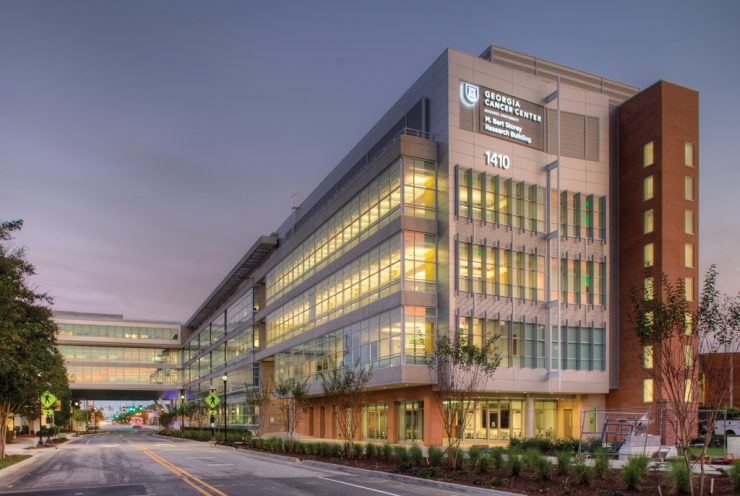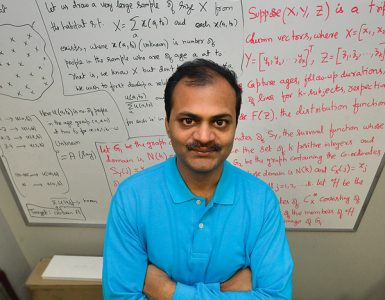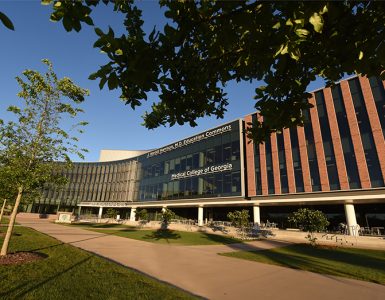
One of our milestone achievements of 2018 strikes at the heart of a rising global health epidemic – cancer. The problem is especially acute in Georgia, where more than 80 counties exceed the national cancer death rate and approximately 17,700 deaths occur each year, making it the second-leading cause of death in our state.
Physicians and scientists at the Medical College of Georgia are firmly committed to changing that statistic, and thanks to the generous support of the late philanthropist M. Bert Storey and Georgia Gov. Nathan Deal, we are well on our way.
Seventy-two thousand square feet of new space in the M. Bert Storey Research Building at the Georgia Cancer Center was completed this fall and opened at a special ceremony this month. The addition increases our cancer research footprint to 228,000 square feet and is further evidence of our continued commitment to the Medical College of Georgia and all those who call it home.
The $62.5 million project is also representative of the inextricable link between research and clinical care at our institution. The building’s most dramatic feature, a five-story connector across Laney-Walker Boulevard, creates a discovery-to-treatment environment that facilitates communication and collaboration between cancer researchers and clinicians and further enables research opportunities with the potential to produce next-generation cancer diagnostics and treatments.
As patients and their families request – and deserve – more sophisticated and complex care, it is imperative that we expand our current research capacity. The new building adds 22,000 square feet of lab space, including four floors of open-concept space with shared resources and special equipment such as flow cytometry, radiation therapy research platforms and quantitative pathology imaging. Each floor has a specific basic science focus and space for community and state forums on cancer-related topics.
Our efforts to decrease the burden of cancer in Georgia, however, don’t end there. I’m also pleased to report that 12 new cancer specialists have been welcomed to our expert team this past year under the direction of Dr. Anand P. Jillella, chief of the Division of Hematology/Medical Oncology at the Medical College of Georgia and director of the Georgia Cancer Center Ambulatory Services, Network and Outreach.
One of those recruits – Dr. Vamsi Kota, assistant professor at MCG and director of the Bone Marrow and Stem Cell Transplantation Program at the Georgia Cancer Center, who trained at MCG – is featured in our cover story about the importance of collaboration and an interdisciplinary approach to cancer care for our patients. Dr. Kota returned to us this July and will be bringing other innovative therapies like CAR-T cell therapy – in which these drivers of a patient’s immune response are modified to better attack their cancer. I encourage you to read more about his resilient commitment to one patient and his family in the pages that follow.
It’s a good example of how MCG’s clinicians and scientists are among the best in their field and come to work each day with a laser-like focus on improving the lives of patients. Here’s another. One of those scientists, Dr. Ravindra Kolhe, molecular pathologist and director of the Georgia Esoteric and Molecular Laboratory in the MCG Department of Pathology, is the primary developer of a new test called Augusta OncoTarget.
Augusta OncoTarget, one of the latest additions to MCG’s GEM Lab, includes next-generation sequencing that enables large numbers of genes, and an unprecedented number of known cancer-causing variants in those genes, to be tested simultaneously. Bioinformatics system IBM Watson for Genomics then performs a rapid analysis of the large amount of data generated to help identify the patient’s variants as well as drugs, which are already in clinical use or under study, known to target them.
In addition, Kolhe’s lab is the seventh academic lab designated for the NCI-MATCH trial, which is assessing the effectiveness of targeting cancer-causing gene changes rather than cancer type. This is truly game-changing, precision medicine for our patients and very exciting.
Finally, I would like to provide you with an update on the search for a new director of the Georgia Cancer Center. A national search has supplied a pool of qualified applicants, who are now visiting campus. This recruitment is critical to our pursuit of additional research funding and eventual National Cancer Institute designation. We anticipate having a new director named and onboarded by July 1.
We appreciate your support as we work to create a healthier, more prosperous Georgia and train the next generation of health care professionals. This is just the beginning of a very important journey, and we look forward to updating you on our progress.
Sincerely,
Brooks Keel, PhD
President, Augusta University
CEO, AU Health System









